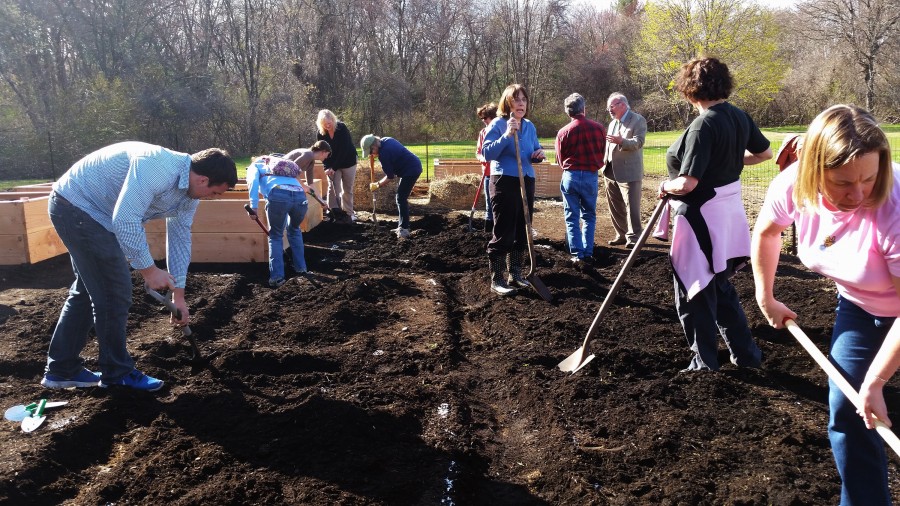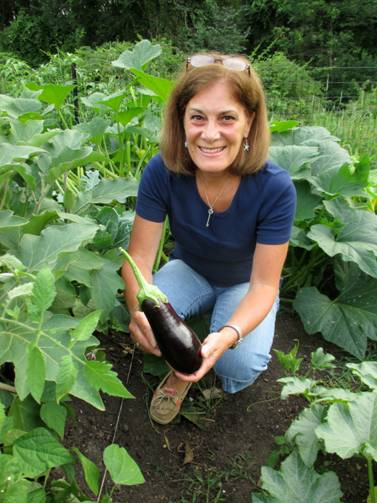In Full Bloom

The garden is the result of an innovative collaboration among various Town departments: LPS, the Department of Public Facilities (DPF) and the Department of Public Works (DPW), with expert input from Lexington Community Farm (LexFarm), and LPS food service providers, Whitsons.
“Look at the size of the pumpkins – I’ve never seen them this early!” said Don Chamberland. He was admiring a riot of vines and Cinderella’s-coach-worthy gourds overspilling one corner of the new Employee Wellness Garden in the field behind the Lexington Public Schools (LPS) Central Administration Building on Maple Street.
Chamberland’s wife Mary Lou, a kindergarten assistant at Fiske Elementary School, is one of 25 LPS employees who signed up for a season of organic gardening under the umbrella of the LPS Employee Wellness Program. On a warm late July evening, while bees buzzed around colorful clumps of cornflowers, zinnias and sunflowers in the shared cutting-garden, she was harvesting eggplants and giant knobbly summer squash from the 4-foot by 8-foot plot she shares with ESL instructor Carolyn Hine.
The garden is the result of an innovative collaboration among various Town departments: LPS, the Department of Public Facilities (DPF) and the Department of Public Works (DPW), with expert input from Lexington Community Farm (LexFarm), and LPS food service providers, Whitsons. “It’s so much fun just to watch it grow and see the progress of it all,” said Chamberland. “I’m just so glad Bob Harris came up with this great idea!”
The garden is the best example of what we in education call ‘the growth mindset.”
Bob Harris,
LPS Assistant Superintendent
The garden is the best example of what we in education call ‘the growth mindset.”
Bob Harris,
LPS Assistant Superintendent
START WITH COMPOST
In December 2013, Bob Harris, LPS Assistant Superintendent for Human Resources, came across a magazine article about a new Massachusetts law concerning the disposal of organic waste. That prompted him to investigate the waste generated by LPS food services, and explore the possibility of setting up an internal composting system. In the end, the composting scheme was never pursued, but the germ of an idea had been sown.
Harris’s office in the Central Administration Building overlooks a former playground, bounded by woodland. With his mind still revolving thoughts of compost and the food supply, he realized that there was an un-utilized resource right outside his window – a sunny field that could be turned into a garden for the use of LPS employees. Learning about and then practicing organic gardening would be an extra benefit that fit right into the holistic model of wellness embodied in the wide-ranging LPS Employee Wellness Program, launched in 2012-13.
In early 2014, Harris marshaled a planning team to help determine the viability of the Employee Wellness Garden, and figure out how to deploy existing resources to make it a reality. The group included Jacky Dick, Coordinator of the LPS Employee Wellness Program, Kevin Silvia, Food Services Director, of Whitsons, Bill Whitson, coordinator of student garden projects for Whitsons, Shawn Newall, Lexington’s Assistant Director of Public Facilities, and Nancy Gold, of LexFarm’s Education Committee.
FROM FIELD TO GARDEN
After identifying a specific site, for its sunny aspect, easy access to parking, and proximity to a water supply, and getting the all-clear from the Lexington Conservation Commission and the Board of Health, Harris and the team broke ground in Fall 2014.
With documentary footage from his smartphone, Harris replayed the multi-stage process by which a dormant piece of land was brought back to life. “DPF came in with a bobcat and just tore it up,” he said, showing a video of the first stage in the creation of the 2400-square-foot garden. “We wanted to get really high grade material to amend the soil,” he said, scrolling to another clip documenting the delivery of 42 cubic yards of rich black compost from an organic farm on the North Shore.
In all decisions about the site including location, preparation, soil analysis and improvement, Harris enlisted the expert advice of Charlie Radoslovich, LexFarm’s backyard garden guru. For the last six years Radoslovich, whose motto is “Don’t mow it, eat it!” has been urging people to dig up their lawns and plant vegetables (www.radurbanfarmers.com).
It’s just so great to go out there and be surrounded by so much lush green and color. It makes me feel really happy that the place where I work has given us something like this.”
Beverly Quirk
It’s just so great to go out there and be surrounded by so much lush green and color. It makes me feel really happy that the place where I work has given us something like this.”
Beverly Quirk

When his initial analysis showed the soil to be acidic and low in nitrogen, Radoslovich recommended adding the organic compost, and insulating half of the plot through the winter with a mixture of “green cover” provided by rye-grass and vetch, and the other with a layer of salt-marsh hay. “You’re nurturing the soil back to life, trying to encourage as much microbiology as possible,” he said.
Radoslovich emphasized the collaborative nature of the project. “This was a town wide effort,” he said. “DPF and DPW were excellent partners,” said Harris. “DPF lined up all the other contractors for things we couldn’t do internally, like moving the shed and putting in the fence.” He was referring to the toolshed, that needed to be moved from the far side of the field – and got stuck in the mud in the process – and the installation of a sturdy wire perimeter fence set in a two-foot deep trench, to keep out animal pests. With the addition of four wooden raised beds and the installation of pathways, to ensure disabled access, the garden was ready for planting in Spring 2015.
AN ORGANIC LEARNING CURVE
Connecting gardening with learning was always a central aim of the project. “The garden is the best example of what we in education call ‘the growth mindset,’” said Harris, as it is both literally and metaphorically a place of growth, not only for plants, but also for the people tending and learning about them. So in Spring 2014, while the garden was still in the planning stage, LPS Employee Wellness Program Coordinator Jacky Dick contacted LexFarm about offering a class on organic gardening.
Taught by Radoslovich, Nancy Gold and former fourth-grade teacher and LexFarm volunteer Linda Levin, the seven-session hands-on class was a prerequisite for any aspiring gardener applying for a plot in the Employee Wellness Garden. The class has now run for three terms, the most recent being in Spring 2015, starting out in LexFarm’s greenhouse at Lowell Street on the Arlington border, and moving to the garden itself in late April.
“I’ve never really grown anything myself, apart from a couple of tomatoes in a flower pot,” said data specialist Beverly Quirk, who signed up for the class as an experiment and to challenge herself to learn something new. “Charlie and Nancy were just really helpful, friendly and informative,” she said. With the information, skills and confidence she gained, she has successfully grown cucumbers, radishes, peas and spinach, and is impatiently waiting for her tomatoes to ripen.
A seasoned gardener who retired as an Occupational Therapist from Estabrook Elementary School in June, Cynthia Kimball found she still had much to learn from the class, “mainly about the need to choose seeds carefully, and think about companion gardening and how to rotate our plots.”
“I’ve never worked with such good soil,” said Kimball, and she has found that the organic seeds from the new Lexington Seed Library at Cary Library, which Gold coordinates, “have germinated so much better than those from regular seed companies.” Of the garden itself, she said: “I feel I’m in a magic land when I go there – it’s truly like a dream to see how fast things grow.”
A GROWING COMMUNITY
“It’s not just a garden – it’s a place for people to make connections with other people,” said Harris, who has been struck by the wide range of employees who have signed up as gardeners. “We have teachers, instructional support staff, clerical staff, custodians, administrators – they say it’s a really great place for them to connect with other people in the school system,” he said.
The garden also bridges generations, as it includes a large raised bed for the use of Harrington first graders – that’s the one currently filled with pumpkins – and a plot for LABBB students (special needs students from Lexington, Arlington, Burlington, Bedford and Belmont), who have volunteered to weed and water other gardeners’ patches during the vacation.
The project has multiple benefits, said Employee Wellness Program Coordinator Jacky Dick. “Spending time in the garden gives employees a peaceful place where they can get exercise, be creative and enjoy the outdoors,” she said. Along with supporting sustainability and providing healthy chemical-free produce, she noted, the garden has also “promoted community by our collaboration with LexFarm and by the arrangement of plot sharing –where employees chose to share a plot and work with each other to cultivate the garden.”
No garden is trouble free, and the gardeners of the Employee Wellness Garden are currently dealing with an outbreak of powdery mildew, with hands-on and email assistance from Nancy Gold. But many are already looking forward to the next season. “I will definitely do it next year – I’ll be wiser and smarter and know what to plant!” said Mary Lou Chamberland. For Beverly Quirk, the garden has given her more than just the discovery of an unexpected green thumb. “It’s just so great to go out there and be surrounded by so much lush green and color,” she said. She paused, then added: “It makes me feel really happy that the place where I work has given us something like this.”
